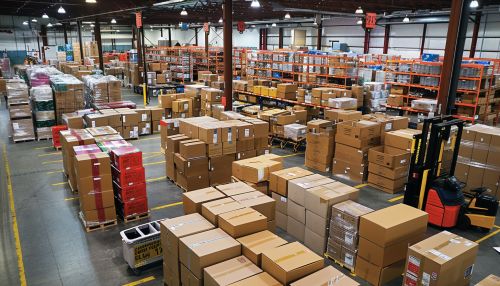Logistics
Overview
Logistics is a critical field that deals with the management of the flow of goods, information, and other resources, including energy and people, between the point of origin and the point of consumption. Its goal is to meet the requirements of consumers (often, and originally, military organizations). Logistics involves the integration of information, transportation, inventory, warehousing, material handling, and packaging, and occasionally security. The complexity of logistics can be modeled, analyzed, visualized, and optimized by dedicated simulation software. The minimization of the use of resources and time are common motives.
History
The term "logistics" is derived from the Greek word "logistikos," meaning skilled in calculating. The first military use of the term was by the Roman army, which referred to the process of supplying their military forces as "logistica." The term was later adopted by French military strategists in the 19th century to describe the management of military supply chains and has since been incorporated into the business lexicon.
Logistics Management
Logistics management is a subset of the larger field of supply chain management that deals with the planning, implementation, and control of the efficient and effective forward and reverse flow and storage of goods, services, and related information between the point of origin and the point of consumption. This includes the coordination and collaboration with channel partners, which can be suppliers, intermediaries, third-party service providers, and customers.
Types of Logistics
There are several types of logistics that cater to specific needs and industries. These include:
Military Logistics
In military science, maintaining one's supply lines while disrupting those of the enemy is a crucial element of military strategy, and logistics is a key component of this. The historical leaders Hannibal, Alexander the Great, and the Duke of Wellington are considered to have been logistical geniuses.
Business Logistics
Business logistics refers to the processes that ensure the smooth flow of products and information between suppliers, manufacturers, distributors, retailers, and consumers. This field has evolved dramatically since the 1960s with the rise of computer technology and globalization.
Event Logistics
Event logistics involves managing the flow of goods and materials to and from events such as concerts, festivals, or conferences. This can involve everything from transportation and storage to setting up and tearing down stages, tents, and other event infrastructure.
Service Logistics
Service logistics refers to the acquisition, scheduling, and management of the facilities/assets, personnel, and materials to support and sustain a service operation or business.
Emergency Logistics
Emergency logistics is a term used by the logistics, supply chain, and manufacturing industries to denote specific time-critical modes of transport used to move goods or objects rapidly in the event of an emergency.
Logistics Processes
Logistics processes typically include a range of activities like procurement, production, packaging, transportation, storage, supply, sales, and customer service. These processes are generally divided into two main categories: inbound logistics and outbound logistics.
Inbound Logistics
Inbound logistics is one of the primary processes of logistics, concentrating on purchasing and arranging the inbound movement of materials, parts, and/or finished inventory from suppliers to manufacturing or assembly plants, warehouses, or retail stores.
Outbound Logistics
Outbound logistics is the process related to the storage and movement of the final product and the related information flows from the end of the production line to the end user.
Logistics Technologies
Technological advancements have greatly enhanced the efficiency and effectiveness of logistics. These technologies include:
Warehouse Management Systems (WMS)
A Warehouse Management System (WMS) is a software application that supports the day-to-day operations in a warehouse. WMS programs enable centralized management of tasks such as tracking inventory levels and stock locations.
Transportation Management Systems (TMS)
A Transportation Management System (TMS) is a subset of supply chain management concerning transportation operations and may be part of an enterprise resource planning system.
Automated Guided Vehicles (AGVs)
Automated Guided Vehicles (AGVs) are used in industrial applications to move materials around a manufacturing facility or a warehouse.
Radio Frequency Identification (RFID)
RFID is an essential element of many logistics systems today, providing a method of identifying and tracking goods and assets.
Future of Logistics
The future of logistics is expected to be shaped by emerging technologies such as artificial intelligence, robotics, and blockchain. These technologies promise to automate and streamline logistics processes, reducing costs and improving efficiency.
See Also


